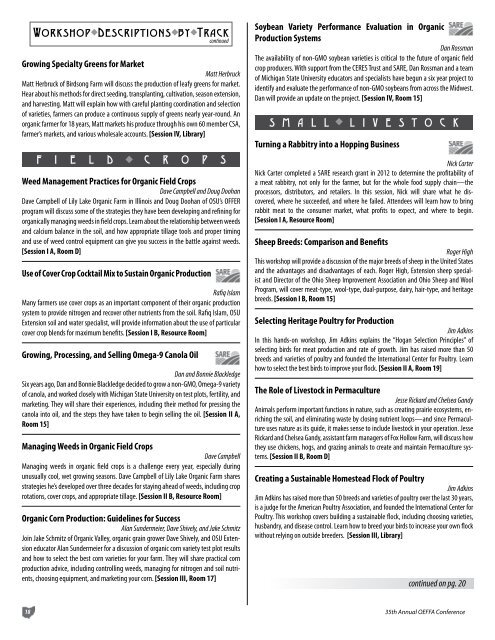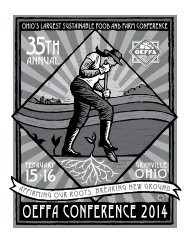1glqMdS
1glqMdS
1glqMdS
Create successful ePaper yourself
Turn your PDF publications into a flip-book with our unique Google optimized e-Paper software.
Workshop Descriptions by Track<br />
continued<br />
Growing Specialty Greens for Market<br />
Matt Herbruck<br />
Matt Herbruck of Birdsong Farm will discuss the production of leafy greens for market.<br />
Hear about his methods for direct seeding, transplanting, cultivation, season extension,<br />
and harvesting. Matt will explain how with careful planting coordination and selection<br />
of varieties, farmers can produce a continuous supply of greens nearly year-round. An<br />
organic farmer for 18 years, Matt markets his produce through his own 60 member CSA,<br />
farmer’s markets, and various wholesale accounts. [Session IV, Library]<br />
F I E L D C R O P S<br />
Weed Management Practices for Organic Field Crops<br />
Dave Campbell and Doug Doohan<br />
Dave Campbell of Lily Lake Organic Farm in Illinois and Doug Doohan of OSU’s OFFER<br />
program will discuss some of the strategies they have been developing and refining for<br />
organically managing weeds in field crops. Learn about the relationship between weeds<br />
and calcium balance in the soil, and how appropriate tillage tools and proper timing<br />
and use of weed control equipment can give you success in the battle against weeds.<br />
[Session I A, Room D]<br />
Use of Cover Crop Cocktail Mix to Sustain Organic Production<br />
Rafiq Islam<br />
Many farmers use cover crops as an important component of their organic production<br />
system to provide nitrogen and recover other nutrients from the soil. Rafiq Islam, OSU<br />
Extension soil and water specialist, will provide information about the use of particular<br />
cover crop blends for maximum benefits. [Session I B, Resource Room]<br />
Growing, Processing, and Selling Omega-9 Canola Oil<br />
Dan and Bonnie Blackledge<br />
Six years ago, Dan and Bonnie Blackledge decided to grow a non-GMO, Omega-9 variety<br />
of canola, and worked closely with Michigan State University on test plots, fertility, and<br />
marketing. They will share their experiences, including their method for pressing the<br />
canola into oil, and the steps they have taken to begin selling the oil. [Session II A,<br />
Room 15]<br />
Managing Weeds in Organic Field Crops<br />
Dave Campbell<br />
Managing weeds in organic field crops is a challenge every year, especially during<br />
unusually cool, wet growing seasons. Dave Campbell of Lily Lake Organic Farm shares<br />
strategies he’s developed over three decades for staying ahead of weeds, including crop<br />
rotations, cover crops, and appropriate tillage. [Session II B, Resource Room]<br />
Organic Corn Production: Guidelines for Success<br />
Alan Sundermeier, Dave Shively, and Jake Schmitz<br />
Join Jake Schmitz of Organic Valley, organic grain grower Dave Shively, and OSU Extension<br />
educator Alan Sundermeier for a discussion of organic corn variety test plot results<br />
and how to select the best corn varieties for your farm. They will share practical corn<br />
production advice, including controlling weeds, managing for nitrogen and soil nutrients,<br />
choosing equipment, and marketing your corn. [Session III, Room 17]<br />
Soybean Variety Performance Evaluation in Organic<br />
Production Systems<br />
Dan Rossman<br />
The availability of non-GMO soybean varieties is critical to the future of organic field<br />
crop producers. With support from the CERES Trust and SARE, Dan Rossman and a team<br />
of Michigan State University educators and specialists have begun a six year project to<br />
identify and evaluate the performance of non-GMO soybeans from across the Midwest.<br />
Dan will provide an update on the project. [Session IV, Room 15]<br />
S M A L L - L I V E S T O C K<br />
Turning a Rabbitry into a Hopping Business<br />
Nick Carter<br />
Nick Carter completed a SARE research grant in 2012 to determine the profitability of<br />
a meat rabbitry, not only for the farmer, but for the whole food supply chain—the<br />
processors, distributors, and retailers. In this session, Nick will share what he discovered,<br />
where he succeeded, and where he failed. Attendees will learn how to bring<br />
rabbit meat to the consumer market, what profits to expect, and where to begin.<br />
[Session I A, Resource Room]<br />
Sheep Breeds: Comparison and Benefits<br />
Roger High<br />
This workshop will provide a discussion of the major breeds of sheep in the United States<br />
and the advantages and disadvantages of each. Roger High, Extension sheep specialist<br />
and Director of the Ohio Sheep Improvement Association and Ohio Sheep and Wool<br />
Program, will cover meat-type, wool-type, dual-purpose, dairy, hair-type, and heritage<br />
breeds. [Session I B, Room 15]<br />
Selecting Heritage Poultry for Production<br />
Jim Adkins<br />
In this hands-on workshop, Jim Adkins explains the “Hogan Selection Principles” of<br />
selecting birds for meat production and rate of growth. Jim has raised more than 50<br />
breeds and varieties of poultry and founded the International Center for Poultry. Learn<br />
how to select the best birds to improve your flock. [Session II A, Room 19]<br />
The Role of Livestock in Permaculture<br />
Jesse Rickard and Chelsea Gandy<br />
Animals perform important functions in nature, such as creating prairie ecosystems, enriching<br />
the soil, and eliminating waste by closing nutrient loops—and since Permaculture<br />
uses nature as its guide, it makes sense to include livestock in your operation. Jesse<br />
Rickard and Chelsea Gandy, assistant farm managers of Fox Hollow Farm, will discuss how<br />
they use chickens, hogs, and grazing animals to create and maintain Permaculture systems.<br />
[Session II B, Room D]<br />
Creating a Sustainable Homestead Flock of Poultry<br />
Jim Adkins<br />
Jim Adkins has raised more than 50 breeds and varieties of poultry over the last 30 years,<br />
is a judge for the American Poultry Association, and founded the International Center for<br />
Poultry. This workshop covers building a sustainable flock, including choosing varieties,<br />
husbandry, and disease control. Learn how to breed your birds to increase your own flock<br />
without relying on outside breeders. [Session III, Library]<br />
continued on pg. 20<br />
18 35th Annual OEFFA Conference



